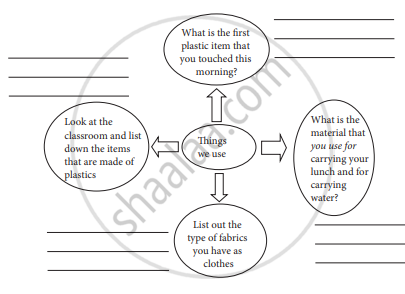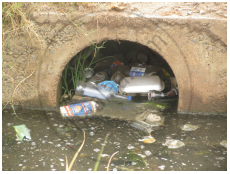Advertisements
Chapters
2: Universe and Space
▶ 3: Polymer Chemistry
4: Chemistry in Daily Life
5: Animals in Daily Life
6: Visual Communication
![Samacheer Kalvi solutions for Science - Term 3 [English] Class 7 TN Board chapter 3 - Polymer Chemistry Samacheer Kalvi solutions for Science - Term 3 [English] Class 7 TN Board chapter 3 - Polymer Chemistry - Shaalaa.com](/images/science-term-3-english-class-7-tn-board_6:5f2b1b2038084cf381bfa42c826a928c.jpg)
Advertisements
Solutions for Chapter 3: Polymer Chemistry
Below listed, you can find solutions for Chapter 3 of Tamil Nadu Board of Secondary Education Samacheer Kalvi for Science - Term 3 [English] Class 7 TN Board.
Samacheer Kalvi solutions for Science - Term 3 [English] Class 7 TN Board 3 Polymer Chemistry Evaluation [Pages 62 - 64]
Choose the correct answers
The first man-made fibre is ______.
Nylon
Polyester
Rayon
Cotton
Which of the following is the strongest?
Rayon
Nylon
Acrylic
Polyester
When you place a natural fibre in a flame it ______.
melts
burns
gets nothing
explodes
A synthetic fibre which has similar properties to wool is______.
Nylon
Polyester
Acrylic
PVC
A good application of plastic is the use of ______
Blood bags
Plastic cutlery
Plastic straws
Plastic carry bag
______ is a non-biodegradable material
Paper
A plastic bottle
Cotton cloth
Wool
PET is the acronym for ______.
Polyester
Polyester and terylene
Polyethylene terephthalate
Polyetheneterylene
Fill in The Blanks.
______ is an example of polyester fabric.
______ are used to identify different types of plastics.
A______is a long chain made up of many repeated small units called monomers.
A natural fibre is called ______.
A natural fibre obtained by boiling cocoons is called ______.
True or False
A lot of plastic pollutes our environment.
True
False
True or False
Refuse (avoid) is the best way to manage plastic.
True
False
True or False
It is good to wear clothes made of synthetic fibres while cooking.
True
False
True or False
Degradable plastics break down into tiny pieces called microplastics.
True
False
True or False
Cotton is a natural polymer.
True
False
Match the Following
| A | B |
| Nylon | Thermoplastic |
| PVC | Thermosetting plastic |
| Bakelite | Fibre |
| Teflon | Wood pulp |
| Rayon | Non-stick cookwares |
Arrange in Correct Sequence
| 1. | Mix water, starch, vinegar and glycerin in a cooking pot. |
| 2. | Let the article cool for 24 hours before we use it. |
| 3. | Shape material to form a cup or bowl. |
| 4. | Continuously mix on medium heat until the liquid turns clear. |
| 5. | When the liquid begins to bubble it is ready to be taken off the stove. |
| 6. | Spread the gel onto aluminium foil and cool. |
Analogy
Cotton: natural : Polyester: ______.
PLA spoon: compostable: Plastic spoon: ______
Nylon: melts on heating: Silk: ______.
Assertion and Reason
A: Vegetable peels buried in the soil disappear within two weeks.
R: Vegetable peels are compostable.
Both A and R are true and R is the correct explanation of A.
Both A and R are true but R is not the correct explanation of A.
A is true but R is false.
A is false but R is true.
Assertion and Reason
A: It takes a very long time for nylon clothes to breakdown into microfibers but cotton clothes need only six months to decompose.
R: Nylon made out of petrochemicals is non-biodegradable and cotton cloth is biodegradable.
Both A and R are true and R is the correct explanation of A.
Both A and R are true but R is not the correct explanation of A.
A is true but R is false.
A is false but R is true.
Assertion and Reason
A: It is good to avoid plastics.
R: Plastics end up polluting the environment.
Both A and R are true and R is the correct explanation of A.
Both A and R are true but R is not the correct explanation of A.
A is true but R is false.
A is false but R is true.
Crossword
Across
1. Fibre that is used as synthetic wool.
2. A plastic used for making water bottles.
3. A long chain made of small repeatingmonomers.
4. Another name for this semi-synthetic fibre is artificial silk.
Down
5. A type of fibre that is naturally obtained from a cocoon.
6. A synthetic fibre classified as polyester.
7. A polymer used for making rope.

Very Short Answer
What is the chemical name of the polymers that make up cotton?
What gives plastic different qualities and characteristics?
It is not advisable to burn plastic and synthetic fabrics. Why?
A bucket made of plastic does not rust like a bucket made of iron. Why?
Why is it better to avoid the use of plastic products?
Give two examples of thermosetting plastics.
What is the 5 R principle?
Short Answer.
What does the term biodegradable mean?
What kind of fabric is suitable to dress-up and play in the summer?
How do plastics impact animals and the environment?
Long Answer.
List the advantages and disadvantages of synthetic fibres.
Suggest safe methods of disposing plastics.
HOTS
The Tamil Nadu Government has banned the use of one-time use throwaway plastics. Why do you think this is important?
A plastic bag dumped in the soil stays without breaking down for 500 years. If a new generation starts in every 30 years, how many generations would it take to see the plastic bag finally broken down?
Fill in the blanks

Look at the following picture and explain what is happening.

Read the following information and convert them into a graph to compare the countries and the amount of plastic they use.
China contributes the highest share - that is around 28%, of the total plastic used globally. Indonesia uses 10%, both the Philippines and Vietnam use 6% each; Thailand uses 3.2%, Egypt 3%, Nigeria 2.7% and South Africa 2%.
Solutions for 3: Polymer Chemistry
![Samacheer Kalvi solutions for Science - Term 3 [English] Class 7 TN Board chapter 3 - Polymer Chemistry Samacheer Kalvi solutions for Science - Term 3 [English] Class 7 TN Board chapter 3 - Polymer Chemistry - Shaalaa.com](/images/science-term-3-english-class-7-tn-board_6:5f2b1b2038084cf381bfa42c826a928c.jpg)
Samacheer Kalvi solutions for Science - Term 3 [English] Class 7 TN Board chapter 3 - Polymer Chemistry
Shaalaa.com has the Tamil Nadu Board of Secondary Education Mathematics Science - Term 3 [English] Class 7 TN Board Tamil Nadu Board of Secondary Education solutions in a manner that help students grasp basic concepts better and faster. The detailed, step-by-step solutions will help you understand the concepts better and clarify any confusion. Samacheer Kalvi solutions for Mathematics Science - Term 3 [English] Class 7 TN Board Tamil Nadu Board of Secondary Education 3 (Polymer Chemistry) include all questions with answers and detailed explanations. This will clear students' doubts about questions and improve their application skills while preparing for board exams.
Further, we at Shaalaa.com provide such solutions so students can prepare for written exams. Samacheer Kalvi textbook solutions can be a core help for self-study and provide excellent self-help guidance for students.
Concepts covered in Science - Term 3 [English] Class 7 TN Board chapter 3 Polymer Chemistry are Man-made Fibre: Plastics, Types of Plastics, Identifying Different Types of Plastics: Resin Codes, Harmful Effects of Plastics, Biodegradable Plastics, Recycling of Plastic, Polymer Chemistry: Polymer, Fibre, Fabrics, Plant Fibres: Cotton, Plant Fibre: Jute Fibre, Animal Fibres: Wool, Animal Fibre: Silk, Man-made Fibre: Synthetic Fibres, Rayon, Nylon, Plastic Eating Bacteria, Glass, Types of Glass, Dacron, Terylene, Terene.
Using Samacheer Kalvi Science - Term 3 [English] Class 7 TN Board solutions Polymer Chemistry exercise by students is an easy way to prepare for the exams, as they involve solutions arranged chapter-wise and also page-wise. The questions involved in Samacheer Kalvi Solutions are essential questions that can be asked in the final exam. Maximum Tamil Nadu Board of Secondary Education Science - Term 3 [English] Class 7 TN Board students prefer Samacheer Kalvi Textbook Solutions to score more in exams.
Get the free view of Chapter 3, Polymer Chemistry Science - Term 3 [English] Class 7 TN Board additional questions for Mathematics Science - Term 3 [English] Class 7 TN Board Tamil Nadu Board of Secondary Education, and you can use Shaalaa.com to keep it handy for your exam preparation.
